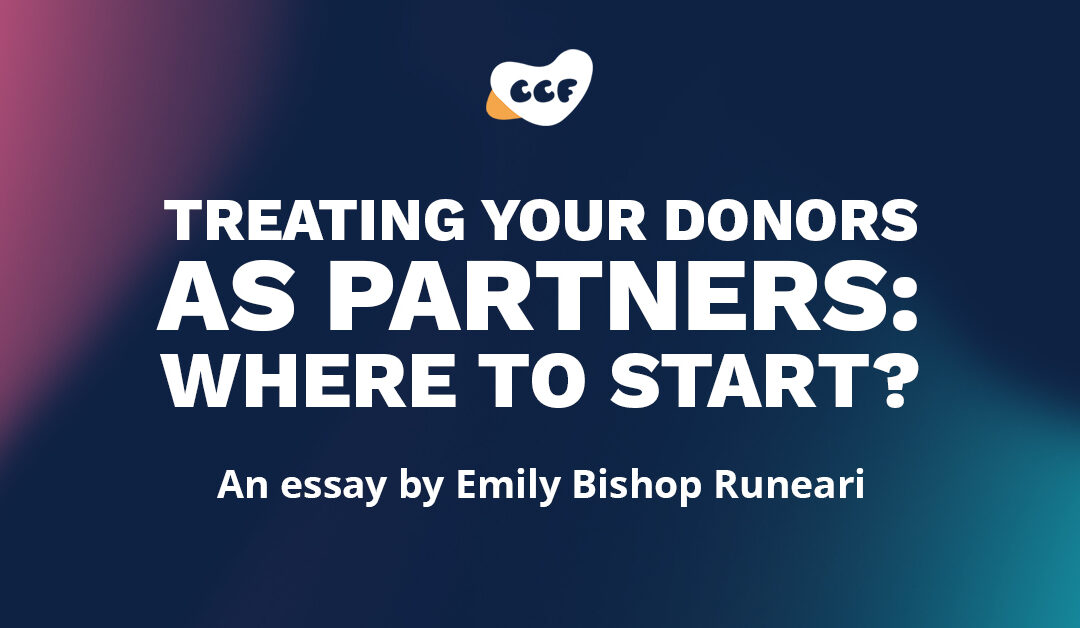By Emily Bishop Runeari, Progressive Political Fundraiser
One of the key tenets of Community Centric Fundraising is “Treating Your Donors as Partners” – but where do you start?
Philanthropy has a difficult history. It was created in capitalism, rooted in the patriarchy, and often fueled by racism. As progressive fundraisers, we are all likely seeking ways to improve the field for the future. But the task looms large and can seem unapproachable, making it easy to retreat into problematic patterns and disillusionment, thinking change is impossible.
When our daily lives are filled with Salesforce data entry, grant reports, call time, and board meetings, who has time to make sweeping changes?
We are not all going to make our donor bases more diverse overnight or change oppressive structures in America, but we can make small changes. In fact, it is our responsibility as fundraisers to improve the profession, and even more so if we carry layers of privilege.
As a white woman with access to many major donors and spaces of wealth, I have a responsibility to use this access to seek change.
One of the key tenets of Community Centric Fundraising is “Treating Your Donors as Partners” – but where do you start?
Four ideas you can begin implementing now, no matter the size, age, or type of organization
1. Know your organization’s (or better yet, movement’s) goal. Get your donor there. Every individual donor you are trying to solicit should have a strategy and a goal. Usually, this goal is an increased or additional gift, such as “Solicit this donor for $50,000, and upgrade from their $25,000 gift.” Instead of thinking of only revenue goals, reshape your donors’ strategies to have a double-end goal of increased revenue and a deeper investment in your organization or movement.
Perhaps your organization’s goal is to focus on inclusivity in the reproductive rights movement. How can you better educate your donor on this? If you do not educate your donor, what effect will this have on your movement’s goals? Think of all the people your donor speaks to or has access to. If the donor can speak about reproductive rights in the most inclusive way, it will only serve your movement.
Framing all your donor interactions with this as the goal will not only enhance their long-term relationship with the movement but could also increase revenue as a side effect. Having these personal, educating moments will bring a donor closer to your mission and heighten their understanding of why increased funds are necessary. Deepening their personal investment will likely also secure support for years to come. And if you are worried that these transparent conversations will result in less revenue? I would argue that if a donor is not open to engaging with you, focus your time on donors who will.
2. Give yourself permission not to be donor-centric. Donors are not customers, and they are not always right. Your organization and whoever is closest to the problem you are trying to solve know how best to solve it. Your donors should be listening to you –your Executive Director, your clients, and your organization’s research –not the other way around. Push yourself to remember this even when money is on the line.
Imagine a donor wants to make a restricted gift to a program your organization has been trying to sunset because evidence shows it is not effective. Historically, you wanted any revenue, so you accepted the gift with the restriction.
Instead, talk to your donor about why that program is not effective, why the need or problem persists, and why unrestricted revenue will get to the root of solving the problem. Just because the donor wants to give in a specific way does not always mean that is the best way. It is ok to let go of money that does not serve the mission or the movement.
Imagine for a minute an alternate scenario in which you did accept the money for the restricted program just to keep the donor around. A mediocre program would likely continue, but at what expense? Could it do more harm to your organization’s bottom line, allocating resources ineffectively? Could it potentially harm your movement or your clients? Remember this when the donor wants to convince you that they are right.
3. Write with confidence, not deference. Every time I see an email that reads, “If you would be so kind as to give me a moment of your time, I would greatly appreciate a phone call or a quick coffee at your convenience,” my head spins. I call this “writing to the queen.” Yes, we should be polite, but we do not always need to be deferential, and we certainly do not need to be passive.
You are writing to a person who hopefully feels as passionately about this work as you do, not someone from whom you have to plead for attention. Write respectfully but with confidence. “Can we meet or talk on the phone next week to discuss your philanthropic goals this year and how they align with our work?”
Writing directly, speaking concisely, and removing the unnecessary, over-the-top pleasantries does two things: First, it shows your confidence and your professionalism, two attributes that will serve you well as a fundraiser. Second, and perhaps more importantly, you begin to ever-so-slightly shift power dynamics. In philanthropy (and in capitalism in general), money dictates power. Most of us in progressive organizations want to see that power shift – and by treating your donor as a partner, you are taking one small step in that direction.
4. Use big opportunities to insert small learnings. As a fundraiser, you are not solely responsible for revenue but for education, too. Is there something in the national news affecting the populations you serve? Reach out to your donor and ask them to talk about it. Tell how your client’s story is affected by a big national issue. For example, maybe gun violence affects a group of young adults you serve through education services. Gun violence may not have any formal place in your mission, but it could affect the education outcomes on which your organization is measured. Have that conversation with donors!
Do not shy away from having meaningful exchanges about structural inequalities – even if (especially if) you usually only talk to that donor about the annual gala.
These are four small things you can start doing now. Every conversation you have, email you exchange, or gift you close is an opportunity to use philanthropy to make society more just and equitable. For those of us who care deeply about that goal, the seemingly impossible can cast doubt on our work (it certainly can, and does, for me!). Try not to be overwhelmed by problematic history or oppressive system structure, just do the next right thing, even if that is as small of a thing as rewriting an email or asking difficult questions in a meeting. With access to people with wealth or power, this could have ripple effects.

Emily Bishop Runeari
Emily Bishop Runeari (she/her) is a fundraising and advocacy professional with over a decade of experience in philanthropy, fundraising and politics. Focusing on major and principal level gifts, Emily works to secure revenue for organizations through transformative relationships with high net worth individuals for both charitable and political organizations. She has held leadership roles at Planned Parenthood Federation of America, Supermajority and the International Rescue Committee.


Well said, Emily! These actions are doable today. I just met with donors and we discussed the “heart of the matter” and they very much got it and I know they feel even more connected to the mission.
Thank you for an interesting and informative read – I will suggest to colleagues that they adopt such techniques